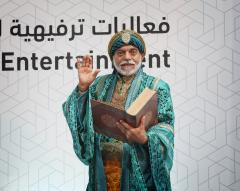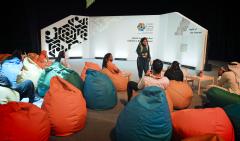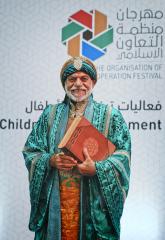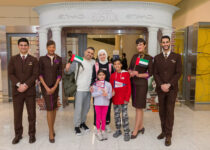The 2nd Organisation of Islamic Cooperation Festival (OIC), held under the patronage of His Excellency Sheikh Nahyan bin Mubarak Al Nahyan, UAE Minister of Tolerance, at Abu Dhabi National Exhibition Centre (ADNEC) until Saturday, April 27, is serving as a vital vehicle to keep age-old cultural traditions alive by engaging future generations and new audiences.
Running under the theme ‘One Nation Unified by Benevolent Cooperation, Justice & Tolerance’, the four-day festival is uniting nations from across the Islamic world, shedding light on the diversity of Islam and the values of the faith through essential elements including music, arts and cuisine.
Designed to celebrate the underlying positivity of Islam and its cultural foundations of tolerance, unity and harmony, the festival is offering interactive insights into how Muslims worldwide can preserve their religious principles while adapting to different cultures. The four-day celebration, which coincides with the UAE’s ‘Year of Tolerance’ and the 50th anniversary of the OIC, is also offering non-Muslims a pathway to understanding more about Islam.
Passing on knowledge of generations
Amongst the exhibitors keeping their traditions alive is Wafa Ghnaim, who is demonstrating the beauty and socioeconomic benefits of Palestinian embroidery at the Palestine Pavilion at the heart of the festival, organised by the Organisation of Islamic Cooperation in collaboration with the UAE Ministry of Foreign Affairs (MOFA).
“Palestinian embroidery is a form of art that has traditionally been passed on through generations, from mother to daughter, my mother has been teaching Palestinian embroidery for more than 50 years,” said Ghnaim.
“We are here to keep this art form alive. We travel the world to pass on our knowledge to anyone who connects with Palestine to teach them about our identity, heritage and culture. The OIC and the UAE, in celebrating the Year of Tolerance, have granted us a platform where we can preserve and promote our heritage.
“Each country has their own textile traditions, and our embroidery traditions help women document their life stories. We celebrate life and our tradition has empowered women for generations – by selling their works and teaching embroidery, they are able to provide for their families. This is especially true in refugee camps where it is common to pass on knowledge woman to woman, almost like mentoring.”
A modern twist on old tales
Other exhibitors using their participation at the OIC Festival to keep their traditions alive this weekend are renowned Hakawati storytellers Ahmed Yousef and Nairuz El Tambouli, who are entertaining visitors with their energetic and encapsulating narration of meaningful stories.
“I present my storytelling through a series of traditional characters that were published in several Muslim, and Arab, countries across the globe. The rise of social media and new technologies has impacted our art form, so this festival allows us to revive these traditional stories in a modern way.
“Our stories are attractive to all ages, not just children. At the festival we are focusing on stories that have moral, ethical and historical, as well as religious, meaning. The art form has evolved in my 25 years and we are working to strengthen the Islamic values through new ways of telling the story, using lights and sounds to engage.”
“Events like the OIC Festival are so important in this day and age; not only in promoting Islamic and Arabic art on all levels but enabling us to spread the message about Islam and Muslims to the whole world,” added fellow storyteller Nairuz El Tambouli.
“We try to make our stories fun and educational while getting our message across and the UAE is a perfect platform for that as an example of a tolerant country with a variety of nationalities and cultures living and working together in peace. We have an opportunity to reach the hearts of so many open-minded people, while enhancing and enriching knowledge of Arabic traditions.”
Insights into the past and charting the way forward
Providing the right platform to revive and reignite Islamic traditions and cultures was a key component when planning the event, according to festival organisers.
“As an organisation that works to safeguard and protect the interests of the Muslim world in the spirit of promoting international peace and harmony across the globe, it is imperative that we actively preserve cultural activities and art forms that foster tolerance, unity and peace,” said Mr. Youssef Aldobeay, Advisor of H.E the Secretary General for Political Affairs, Elected Assistant Secretary General for Political Affairs and OIC General Secretariat.
“Embroidery and the Hakawati storytelling are steeped in history, meaning and positive messages. As with all the cultural pastimes on display at the festival, they are crucial to enhancing global awareness of the depth and diversity of Islamic culture and enabling us to further our message to the world.”
Final day of four-day celebration
The festival enters its final day on Saturday April 27, with performances on the main stage from the Indonesian Folklore Group, the Al Tannoura Egyptian Troup, soloist Khadeeja and sand art with Shayma Almughairy. Elsewhere, calligraphy workshops will be hosted by Kuwaiti calligrapher Farid Al Ali and Indonesian artist Isep Misbah, while the Hakawati storytelling sessions continue in the children’s entertainment area.
The Festival is open for visitors from 12pm to 8pm in Hall 7 at ADNEC. Entry is free.
For more information, visit www.oicfestivalabudhabi.com










